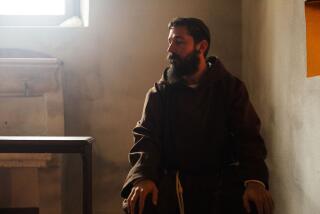Journey to the Vatican
A reverent, long-form character sketch of the young Karol Wojtyla, “A Man Who Became Pope,” charts the four decades leading to his papal election as John Paul II in 1978. The two-part, Italian-produced, English-language miniseries, airing tonight (and encoring Sunday morning) in one four-hour installment on the Hallmark Channel, follows the transformation of Wojtyla from an athletic young scholar to the leader of the Roman Catholic Church against a backdrop of Nazis and communists pillaging and oppressing his native Poland.
Vatican-approved, the by-the-numbers drama exposes no rough edges in its portrayal of the future pontiff, instead focusing on the events that molded him religiously, intellectually and philosophically. Other than emphasizing Wojtyla’s proximity to the Holocaust and the effects of growing up in Wadowice, a town shared by Catholics and Jews, the miniseries avoids drawing direct lines between his early life and his actions as pope. Overall, the pacing of the film is remarkably tight -- a necessity considering how much ground is covered -- and manages to overcome some patches of affected dialogue and a portentous score by Ennio Morricone. Writer-director Giacomo Battiato wisely leans on his uniformly strong international cast to provide pathos and weight to the proceedings.
Polish actor Piotr Adamczyk is exceptional, credibly aging from 19 to 58 while delivering a performance that illuminates Karol’s developing inner life. As a passionate young bohemian in Krakow or a mature professor of ethics at Lublin, Adamczyk projects the intelligence and warmth that made Wojtyla a charismatic leader.
Part 1 opens in 1939 with the German army’s invasion of Poland and finds young Karol and his ailing father fleeing their home with other refugees. During the war, Karol surreptitiously continues his university studies while working in a quarry and participating in underground theater.
His father’s death in 1941 leaves him without a family and the next year he enters a clandestine seminary and prepares for the priesthood.
It is through his friendships with Father Tomasz (Italian leading man Raoul Bova), a priest who helps Jews, and the beautiful Hania (Malgorzata Bela), a childhood friend, that Wojtyla witnesses the Holocaust and the Polish resistance. The film hints at some level of intimacy between Hania and Karol but stops short of indicating a romance.
The second half of the film has the trappings of a Cold War thriller as the Soviet Union replaces Germany as Poland’s oppressor and Wojtyla gains an archenemy in the form of Julian Kordek (Hristo Shopov), an official overseeing religion and the church. Kordek, a Pole himself, immediately recognizes Wojtyla as a threat to communism and opposes him even as he rises through the church ranks.
Though remaining faithful to what he tells his ethics students in warning them against armed confrontation -- “They won’t be afraid of your guns, they will be afraid of your words” -- the future pontiff’s activism is catalyzed by the Polish workers’ rebellion against the Communist government.
At an outdoor Christmas Eve Mass, Wojtyla refuses to back down after Kordek sends soldiers to silence him, delivering his trademark message, “Be not afraid.” The scene of moral strength is rousingly depicted and provides the film with a climax to presage the coda that we expect -- Wojtyla’s election as pope.
Beating to the screen a pair of planned network TV movies on Pope John Paul II, “A Man Who Became Pope” is fairly routine as biopics go. But elevated by Adamczyk’s captivating performance, it provides a flesh-and-blood rendering of a larger-than-life figure.
*
‘A Man Who Became Pope’
Where: Hallmark Channel
When: 8 tonight
Ratings: TV-PG (may be unsuitable for young children)
Piotr Adamczyk...Karol
Malgorzata Bela...Hania
Ken Duken...Adam
Hristo Shopov...Julian Kordek
Ennio Fantastichini...Nowak
Violante Placido...Maria
Matt Craven...Hans Frank
Olgierd Lukaszewicz...Karol’s father
Radoslaw Pazura...Pawel
Kenneth Welsh...Professor Wojcik
Raoul Bova...Tomasz Zaleski
Executive producer Camilla Nesbitt. Director Giacomo Battiato. Teleplay Giacomo Battiato and Carmelo Pennisi.
More to Read
The complete guide to home viewing
Get Screen Gab for everything about the TV shows and streaming movies everyone’s talking about.
You may occasionally receive promotional content from the Los Angeles Times.







